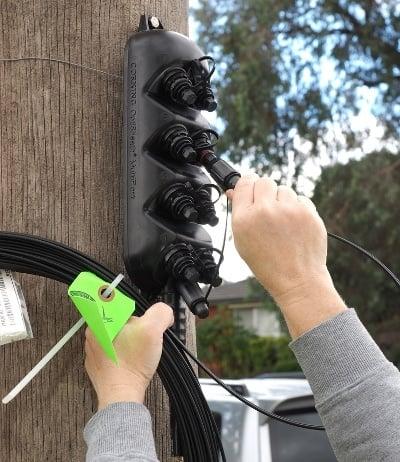G.654E Fiber: Next-Generation Solution for High-Speed Long-Haul Networks
Short summary: G.654E fiber represents the cutting edge of optical transmission technology, specifically engineered for modern high-speed, long-distance networks where traditional fibers fall short in performance and reliability.
1. Understanding G.654E Fiber Technology
G.654E fiber is a specialized single-mode optical fiber designed specifically for terrestrial long-distance transmission systems. Unlike conventional fibers, G.654E combines exceptionally low attenuation with a significantly larger effective area, making it ideal for networks demanding high data rates over extended distances.
Technical Background
Originally developed for submarine optical cable systems in the mid-1980s, G.654 fiber technology evolved through multiple variants (A/B/C/D) optimized for underwater applications. The introduction of G.654E marked a significant milestone, adapting these proven characteristics for terrestrial networks while maintaining the core advantages that made its predecessors successful in challenging marine environments.
| Characteristic | G.654E Fiber | Traditional G.652D |
|---|---|---|
| Effective Area | 110-130 µm² | 80 µm² |
| Attenuation | ≤0.20 dB/km | ≤0.22 dB/km |
| Cut-off Wavelength | 1530 nm | 1260 nm |
| Optimal Wavelength Range | 1530-1625 nm | 1260-1625 nm |
| Primary Application | Long-haul terrestrial | General purpose |
2. Key Advantages Over Traditional Fibers
Enhanced Effective Area for Superior Performance
G.654E fiber features an effective area of 110-130 µm², representing approximately 47% increase compared to standard G.652D fiber (80 µm²). This larger effective area significantly reduces nonlinear effects, allowing for:
- Higher launch power levels without compromising signal integrity
- Extended transmission distances without regeneration
- Improved tolerance to optical signal power variations
Exceptional Low Attenuation Characteristics
The attenuation performance of G.654E fiber typically reaches 0.18-0.20 dB/km, surpassing traditional fibers by approximately 0.02 dB/km. While this difference may seem minimal per kilometer, it becomes substantial over long-haul routes spanning hundreds or thousands of kilometers, resulting in:
- Reduced amplifier requirements
- Lower overall system costs
- Improved signal-to-noise ratio
Superior OSNR Performance
The combination of large effective area and low attenuation enables G.654E fiber to deliver significantly better Optical Signal-to-Noise Ratio (OSNR) performance, particularly critical for:
- 100G+ coherent transmission systems
- DWDM networks with dense channel spacing
- Long-distance terrestrial backbone networks
3. Real-World Applications and Implementation
Long-Distance Terrestrial Networks
G.654E fiber has become the preferred choice for new terrestrial backbone installations, particularly in applications requiring:
- Single-carrier rates exceeding 100Gbps
- Transmission spans over 80-100 kilometers without repeaters
- High-capacity DWDM systems with 40-80 channels or more
Practical note: While G.654E excels in long-haul applications, it’s important to note its limitations for certain scenarios. The cut-off wavelength of 1530 nm restricts operation below this range, making it unsuitable for metropolitan networks operating at 1310 nm or for applications requiring full-spectrum transmission.
Cost-Benefit Considerations
Although G.654E fiber typically commands a premium price compared to G.652D, the total cost of ownership often favors G.654E in appropriate applications due to:
- Reduced need for signal regeneration equipment
- Lower power consumption in amplification systems
- Extended maintenance intervals
- Future-proofing for capacity upgrades
4. Technical Implementation Considerations
Network Planning Requirements
Successful implementation of G.654E fiber requires careful consideration of:
- System operating wavelength range (1530-1625 nm optimal)
- Compatibility with existing transmission equipment
- Splicing and connector requirements specific to large-effective-area fibers
Installation and Maintenance
While G.654E fiber requires slightly modified handling procedures compared to traditional fibers, experienced installation teams can successfully deploy it using standard fiber optic practices with minor adaptations for:
- Splicing parameters optimization
- Connector cleaning and inspection protocols
- Testing procedures adjusted for larger core diameter
5. Future Outlook and Industry Trends
The demand for G.654E fiber continues to grow as network operators face increasing bandwidth requirements and the need to optimize existing infrastructure. Key trends driving adoption include:
- Rapid expansion of cloud services and data center interconnects
- 5G network rollout requiring high-capacity backhaul
- Increasing video content consumption driving bandwidth demand
- Cost reductions making G.654E more accessible for broader applications
Industry experts predict that as manufacturing volumes increase and technology matures, the cost differential between G.654E and traditional fibers will continue to narrow, accelerating adoption across various network segments.
6. ZTO Cable’s G.654E Solutions
At ZTO Cable, we leverage our 20+ years of fiber optic manufacturing experience to deliver premium G.654E fiber solutions optimized for your specific network requirements. Our comprehensive approach includes:
- Full integration from fiber manufacturing to cable production
- Custom cable designs for diverse installation environments
- Technical support from our experienced engineering team
- Quality assurance exceeding IEC 60794 standards
Our production facilities in Hangzhou, Shenzhen, and Hainan ensure consistent quality and reliable delivery for projects of any scale. With annual production capacity exceeding 900,000 km, we’re equipped to support both large-scale backbone deployments and specialized network upgrades.
Ready to upgrade your network with G.654E technology? Contact ZTO Cable for technical consultation, customized solutions, and competitive pricing on our advanced fiber optic products.


